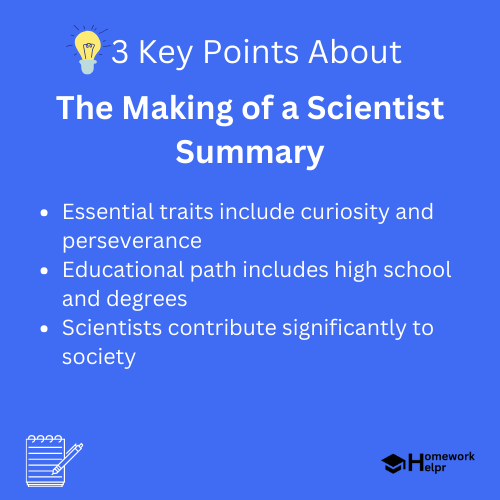📝 Summary
Becoming a scientist is a rewarding journey characterized by curiosity, dedication, and a continual pursuit of knowledge. Essential traits for success include perseverance, creativity, and strong analytical skills. Educational pathways typically involve high school coursework in sciences, a relevant bachelor’s degree, and often a master’s or Ph.D. Specialized research experience is crucial. Scientists face challenges such as funding issues and maintaining work-life balance, but their contributions, including medical advancements and technological innovations, positively affect society. In essence, anyone can aspire to this impactful journey.
The Making of a Scientist
The journey of becoming a scientist is an exciting and enriching experience, filled with a deep curiosity about the world around us. In this article, we will explore the essential qualities, educational paths, challenges, and contributions of scientists while providing valuable insights for aspiring young minds. The rich tapestry of science is woven with threads of inquiry, dedication, and a thirst for knowledge.
Characteristics of a Great Scientist
The first step in understanding what it takes to be a successful scientist is to recognize some of the key characteristics they typically possess. These attributes are crucial in fostering the spirit of discovery and innovation:
- Curiosity: Scientists are naturally curious individuals who question the status quo and seek answers to perplexing questions.
- Perseverance: The path to scientific discovery is often lined with challenges and failures; hence, resilience is a vital quality.
- Creativity: Innovative thinking helps scientists devise experiments and come up with novel hypotheses.
- Analytical Skills: Scientists must be able to analyze data and draw meaningful conclusions based on evidence.
These traits help scientists explore uncharted territories and contribute to human knowledge and understanding. As you think about your aspirations, consider how you can cultivate these qualities in yourself.
Definition
Perseverance: The determination to keep trying despite difficulties. Analytical: The ability to think critically and logically to dissect information.
The Educational Path to Becoming a Scientist
A crucial aspect of becoming a scientist is following the appropriate educational route. Generally, the journey can be broken down into several critical stages:
- High School: Focus on subjects like mathematics, biology, chemistry, and physics to build a strong foundation.
- Undergraduate Degree: Pursue a relevant bachelor‚’ degree in a scientific field, such as biology, chemistry, or physics.
- Graduate Degree: For those who wish to delve deeper, pursuing a Master’s or Ph.D. in a specialized area of science often becomes essential.
- Research Experience: Engaging in internships and research projects can greatly enhance one‚’ practical understanding of scientific methods.
This educational background equips individuals with both the theoretical knowledge and practical skills needed to tackle scientific problems. Furthermore, these experiences lay the groundwork for critical thinking and problem-solving abilities.
Definition
Bachelor‚’ Degree: An undergraduate degree usually awarded after four years of college studies. Ph.D.: A Doctor of Philosophy, which is a higher education degree that involves extensive research and a dissertation.
Challenges Scientists Face
While pursuing a career in science can be rewarding, it also comes with its own set of challenges. Here are some common hurdles scientists encounter:
- Funding Issues: Securing funding for research can be highly competitive and challenging.
- Experimental Failures: Many experiments may not yield expected results, requiring scientists to adapt and modify their approaches.
- Work-Life Balance: The demands of scientific work can sometimes lead to a struggle to maintain a healthy balance between work and personal life.
By understanding these challenges, aspiring scientists can prepare themselves to navigate the complexities of this field more effectively.
Definition
Funding: Financial support for research projects or studies. Research: A systematic investigation into a specific study or question.
Contributions of Scientists to Society
The work of scientists significantly impacts numerous aspects of everyday life. Here are some remarkable contributions made through scientific inquiry:
- Medical Advancements: Scientists have played a critical role in discovering treatments and vaccines for various diseases.
- Environmental Awareness: Research on climate change emphasizes the importance of sustainability and conservation.
- Technological Innovations: Breakthroughs in technology, such as artificial intelligence and biotechnology, have transformed industries.
These contributions are only a few examples of how scientific research can improve public health, environmental sustainability, and quality of life.
❓Did You Know?
Did you know that Albert Einstein, one of the greatest physicists, was a patent examiner before achieving his fame in science?
Real-World Examples of Scientists
To illustrate the various paths scientists can take, let‚’ explore a few famous figures who have left their marks on the world:
- Marie Curie: A pioneer in the study of radioactivity and the first woman to win a Nobel Prize.
- Isaac Newton: Known for his laws of motion and universal gravitation, which laid the foundation for classical mechanics.
- Jane Goodall: Renowned for her groundbreaking research on chimpanzees and her contributions to conservation.
These examples highlight that a career in science can take multiple forms and that dedication can lead to significant advancements across various fields.
Examples
For instance, Isaac Newton’s observations of an apple falling from a tree led him to study gravity, demonstrating how everyday phenomena can ignite scientific discovery.
Conclusion
In summary, the making of a scientist involves a blend of personal attributes, a solid educational foundation, and a commitment to overcoming challenges with resilience and creativity. By nurturing qualities like curiosity and perseverance and recognizing the significance of education and research, aspiring scientists can make substantial contributions to society. The scientific journey is continuous, engaging, and filled with opportunities for discovery, and everyone has the potential to make a remarkable impact.

Related Questions on The Making of a Scientist Summary
What qualities make a great scientist?
Answer: Curiosity, perseverance, creativity, and analytical skills.
What educational path should one follow?
Answer: Start with high school subjects, then pursue degrees.
What challenges do scientists face?
Answer: Funding issues, experimental failures, and work-life balance.
How do scientists contribute to society?
Answer: Through medical advancements, environmental awareness, and technological innovations.
